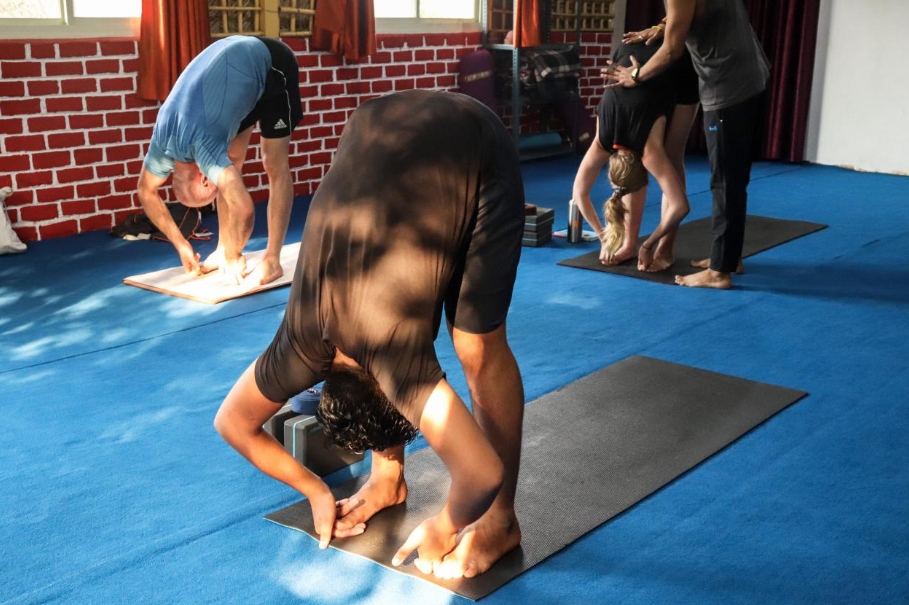A Yoga Teacher Training (YTT) is an in-depth program designed to teach individuals how to become certified yoga instructors. Beyond just learning how to lead a class, YTT dives into the philosophy, anatomy, and deeper practices of yoga. Even if you don’t plan to teach, many people join YTTs to deepen their personal practice and understanding of yoga.
- Core Components of a Yoga Teacher Training:
- Common YTT Levels:
- Why Do People Join YTT?
- Yoga Teacher Training Supports the Mental Health
- How YTT in Rishikesh Supports Mental Health:
- 1. Immersion in a Healing Environment
- 2. Deep Mind-Body Connection
- 3. Study of Yoga Philosophy
- 4. Community & Connection
- 5. Detox from Modern Life
- 6. Holistic Wellness Practices
- The Result?
Core Components of a Yoga Teacher Training:
- Asana Practice: Detailed study of yoga poses—how to perform, adjust, and sequence them safely.
- Anatomy & Physiology: Understanding the body’s mechanics to prevent injuries and improve alignment.
- Yoga Philosophy: Exploration of ancient texts like the Yoga Sutras and principles like the Eight Limbs of Yoga.
- Meditation & Pranayama: Techniques for breath control, mindfulness, and mental clarity.
- Teaching Methodology: Learning how to create classes, guide students, use cues, and hold space.
- Ethics & Lifestyle: Insights into yogic living, ethics of teaching, and building a mindful practice.
Common YTT Levels:
- 200 Hour Yoga Teacher Training Course: The foundational certification, recognized globally, allowing you to teach.
- 300-Hour Yoga Teacher Training Course: An advanced course that builds on the 200-hour, focusing on specialization.
- 500-Hour Yoga Teacher Training Course: Combines 200-hour and 300-hour training for a comprehensive certification.
Why Do People Join YTT?
- To become a certified yoga teacher (usually registered with Yoga Alliance)
- To deepen their personal practice and understanding
- For self-growth, healing, or even a career change
So, we can conclusively can say that a Yoga Teacher Training (YTT) is a transformative journey that goes beyond mastering yoga poses—it’s a deep dive into the philosophy, science, and art of yoga. Whether pursued to become a certified instructor or to deepen personal practice, YTT equips individuals with a holistic understanding of yoga, covering asanas, meditation, breathwork, anatomy, and mindful living. It fosters self-awareness, mental clarity, and emotional balance, empowering participants to not only teach but also live yoga off the mat. Ultimately, YTT is a path of personal growth, healing, and connection, guiding individuals toward a more balanced and purposeful life. Further we will focus on how a yoga TTC helps not to become teacher only but also the mental health.
Yoga Teacher Training Supports the Mental Health
A Yoga Teacher Training in Rishikesh, India—often called the Yoga Capital of the World—offers a deeply transformative experience that can significantly support mental health. Surrounded by the serene Himalayas and the sacred Ganges River, Rishikesh provides a peaceful and spiritual environment that enhances the benefits of yoga, particularly for mental well-being.
How YTT in Rishikesh Supports Mental Health:
1. Immersion in a Healing Environment
- The natural beauty, clean air, and spiritual energy of Rishikesh create an ideal setting for relaxation and self-reflection.
- The peaceful surroundings help reduce stress, anxiety, and mental fatigue.
2. Deep Mind-Body Connection
- YTT focuses on practices like asana (yoga postures), pranayama (breathwork), and meditation that regulate the nervous system and reduce stress.
- Daily mindfulness practices improve emotional balance, concentration, and mental clarity.
3. Study of Yoga Philosophy
- Exploring ancient yogic texts like the Yoga Sutras and Bhagavad Gita provides tools for managing emotions, stress, and life’s challenges.
- Concepts like non-attachment (vairagya) and self-awareness help reduce overthinking and anxiety.
4. Community & Connection
- YTT fosters a sense of belonging and support through shared experiences with like-minded individuals.
- Building connections with peers helps combat loneliness and creates a supportive environment for personal growth.
5. Detox from Modern Life
- Rishikesh promotes a digital detox, encouraging time away from constant notifications and social media, which can help reduce anxiety and mental clutter.
- The simplicity of ashram living promotes mindfulness and presence.
6. Holistic Wellness Practices
- Incorporation of Ayurveda, sound healing, and kirtan (devotional singing) further supports emotional healing and stress relief.
- Many YTTs in Rishikesh include practices like karma yoga (selfless service), fostering gratitude and compassion.
The Result?
Participants often leave feeling:
- Mentally clearer
- Emotionally balanced
- More resilient to stress
- Empowered with tools for lifelong mental well-being
Therefore, a Yoga Teacher Training (YTT) in Rishikesh, India offers more than just a pathway to becoming a certified yoga instructor—it serves as a holistic journey toward mental well-being. Surrounded by nature’s serenity and the spiritual energy of this sacred city, participants gain powerful tools to manage stress, anxiety, and emotional imbalance. Through a combination of yoga practices, meditation, breathwork, and philosophical teachings, YTT in Rishikesh nurtures self-awareness, resilience, and inner peace. The supportive community, coupled with a break from modern distractions, creates an ideal space for healing and personal growth. Ultimately, this transformative experience equips individuals with lifelong strategies to maintain mental clarity, emotional stability, and a deeper sense of purpose.













